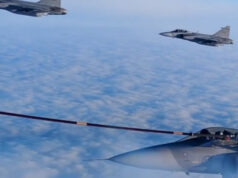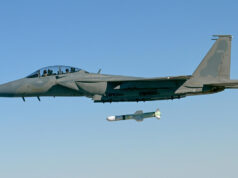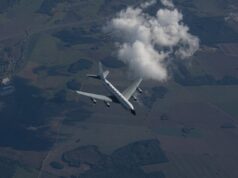The Ministry of Defence now knows the location of the F-35B that crashed on take-off from HMS Queen Elizabeth.
One of the carrier’s F-35B fighters, from 617 Squadron, crashed during operations in the Mediterranean last week. The pilot was able to eject safely.
National Security Adviser Sir Stephen Lovegrove told the Commons Defence Committee yesterday:
“The pilot was recovered safely and is still undergoing medical checks. We are hopefully that he will be absolutely fine. It would be premature of me to comment on the reasons for the accident. The recovery of the flight data recorder and the wreckage are really vital for an accurate investigation to determine the causes of the crash. Clearly the swift recovery of the aircraft is what we would like to do and we are working closely with allies on the mechanics of that. We haven’t got the plane up yet.
‘We are aware of Russian undersea capabilities, and you are quite right to identify them as being state of the art. The kinds of precautions and operations that we are undertaking at the moment are designed at least in part to ensure that the technology of the F-35B remains as confidential as you would like it to be. Those security aspects are very much at the top of our mind. My understanding is that the experts know where the aircraft is.”
What caused the crash?
We don’t know.
What’s going on now?
Britain and America are currently engaged in operations to salvage an F-35B which ditched into the ocean after taking off from HMS Queen Elizabeth. It is understood that while the point at which the jet entered the sea was known, the aircraft’s wings made it glide underwater for a reasonable distance before settling to the bottom of the sea bed in a new location.
Defence Secretary Ben Wallace said:
“There is an ongoing operation to recover the F-35 jet. I am pleased that our pilot is safe and well. We will investigate what happened.”
According to a report in The Times, Britain has asked the United States to help due to the close proximity of American salvage equipment based in Spain.













Good news now fingers crossed as much of it as possible is in one piece.
yep, dry it out (rice is supposed to be good with electronics), get any water out the fuel!, kick tyres and send it off😂
The rice is a good idea but because the aircraft has been in the water for so long they might have to put it on the ship’s main radiator 😜
And stuff it with old newspapers
Cracking an egg into it works too.😉
😆 The moment I read the headline I thought the same ….. dry rice …. container …. airing cupboard !!! Just hope the saltwater hasn’t done too much damage!!!
That isn’t why they are trying to recover the plane!!
They should put a rain cover on it first. Make sure it doesn’t get wet again.
LOL.
It’ll buff out.
Even the furry Dice will need a soapy wash and dry
It’s still good, it’s still good.
🙂
No the plane will have broken up as it sank
Probably but the more complete it is the easier salvage will be.
Well I mean it did literally crash straight in front of the Carrier, so no surprise it was a rather quick locate of the crash site. Could RFA Dilligence have picked this up? It’s still in Portsmouth…
It wouldn’t have sunk like a rock. Anything in water will glide, particularly if it has wings to help with that.
A plane without power can glide significant distances in the air before they hit the ground, it would do the same underwater.
That sort of assumes that the carrier didn’t run over it and that it didn’t get sucked into the props as it went over?
As it hit the water it would have been pretty buoyant with trapped air in the fuselage?
Be interesting to know if it was in once piece – I guess they will/have sent/send an ROV down for a look see.
The issue is more if it is in bits cleaning up all the bits so that there is nothing left for the Russians to pick up and trade with the Chinese.
It is interesting that given the shortage of resources they have that the Russians did concentrate on sub sea. Makes us look a bit silly as we have the tech and know how but won’t quite put the force of resources into amping it up.
You do realise we are in the process of building some of the most advanced ships and submarines in the world. As well as this the plane would have sunk pretty quick, or at least fast enough to clear the ship.
> It is interesting that given the shortage of resources they have that the Russians did concentrate on sub sea.
On the contrary, I believe it is that very shortage that made the Russians focus on the sub-sea domain – for asymmetric warfare. Either by intercepting or interfering with/cutting undersea cables.
Something they have been doing for several decades.
🙂
Not to mention, the med is quite salty and the salinity varies so it’s possible for rather unpredictable glide patterns as it descends to the sea floor
Agreed.
Personally, I would pick as much as it up as we could, destroy the rest and then leave a dummy with a nice (but powerful) anti-handling charge affixed
‘Crash’ sounds like a mild exaggeration. Looked to me like it just ‘fell off the front end’!
🙂
Thank goodness the pilot was OK. From what I can see of the video it may be an idea to have a big red ABORT button for the auto-take-off fitted, and put a bit more of a longer bang in the zero-zero seat to give more of a chance for the pilot to clear the ship in these sort of circumstances. Also make any engine/intake covers are coloured red.
Amazed if the aircraft, which must have floated for at least a few seconds, did not get mashed by the ship and props.
I’m pretty sure (and the more knowledgeable on here will soon correct me) that any covers or protection are dayglo orange, right down to the pitot covers with their little “remove before flight” flags.
We need to have thicker cover that are ties on both side with a bit of rope to ensure both inlet covers are out.
Thank the Lord for Day-Glo Orange that’s how they spotted it
Video shows pilot tried to abort TO just didn’t have room to get it stopped, maybe they should put a arrestor wire across just before ramp hit abort an hook drops so can trap?
The engin blacks and everything are red with big long streamers on to make it obvious !!
with all the lift fan doors open and no sunroof in place water would fill it quite quick
“…maybe they should put a arrestor wire across just before ramp hit abort an hook drops so can trap?”
A good idea in theory, but with the way the main engine nozzle swivels downward on the B model, and the weapons bay, there sadly isn’t any room for a hook
Needs a bit of reverse thrust… but not sure that’s available on the F-35B?
fit couple of old Herc JATO bottles facing fwd?
The B’s don’t have a hook at all. No space with the swivel jet pipe.
Engine/intake covers surely always used to be painted red? Has that changed?
I hear USMC has a drill whereby ground crew remove such items (and ejector seat safety pin) and hand a number of pins to the pilot to prove they have all been removed – pilot also does a walk around of course.
From what I gather it’s unnecessary, the ejector seat fires automatically if the aircraft isn’t going to achieve flight speed off the ramp.
Not with the pins still installed it doesn’t.
Yeah. I’m just saying the ejector seat motor needs a longer burn time to throw the pilot up even more so that the ship does not run him/her over.
With a longer burn time he’d probably land back on the deck and not even get his feet wet!
Exactly. Jobs a good ‘n.
I wonder if the Pilot will be alright, after Flico has ripped him a new Axxxhole ?
If it was a rain cover left in place, why are there not interlocks to stop the engine run-up and/or why didn’t the software detect low power/thrust/speed and abort?
Software has made all our lives easier and given us tremendous benefits but I agree with comments that sometimes we could do with a large red button saying “no thanks, I’ll handle it from here”. Anyone ever get frustrated with the automatic ‘extra’ wipe on your car windscreen wipers.
“Anyone ever get frustrated with the automatic ‘extra’ wipe on your car windscreen wipers.”
YES YES yes! It annoys me and smudges it again. 😜
try fitting new wipers then?
Yes, I seem to get 3 extra wipes, the last one or two squeaking as the screen is by then bone-dry.
This is a good idea, the covers should have “mag lock” connectors to a sensor on the inlet that completes a circuit and flashes a big alarm light / screen warning that a circuit is complete and that a cover is “ON”. But still also need thicker covers about and a bit of rope joining the two main covers.
Mag-lock connectors for the covers with the lock being a sensor being a good idea. But instead of completing circuits, flashing lights, simply have it throw an error to the flight software to not allow engine start in the first place.
Can’t help but think, looking at it again, that the pilot was desperately trying to brake her (plus the uphill effect) so as to at worst, perch her on top of the ramp. Could have saved many £. This would make sense if the engine flamed out early enough to take cat-like reflex action. He did punch out very late.
He tried his best to save it. Whoever is to blame for it’s loss the pilot has that.
Yeah, it’s strange that they take such a short run up as it can’t be very fuel efficient. I think the carrier wants the ability to take off and land at the same time but the run up looks very short if the pilot does want to abort. The only opportunity is before the aircraft moves.
Just a thought, a big net at the end of the flight deck that could catch an aircraft
, and perhaps a rubber gate that could spring up if big red abort take off button was pushed in aircraft, which could also switch off engines and fully apply brakes, even judge whether to eject the pilot!
Well on the plus side they will have a lot of materials data on salt water exposure and crush depth. 😝
I’m having a good deal of trouble swallowing the story that a ‘remove before flight’ cover was left in place. I’ll not be surprised to find out that the actual cause was FOD ingestion during launch.
Why has it taken several days to locate the downed aircraft? Does it not have a pinging position locator as part of a ‘Black Box’. Surely that could be fitted within the £100m price tag?
Yes, all UK military aircraft have a sonar locating beacon (SLB) fitted. This is a statuary requirement stated by the military aviation authority (MAA). Most of the newer aircraft will have one that is part of their crash recorder. Some aircraft also have an additional standalone SLB. There is a world standard for their operating frequency, which is around 37.5KHz.
Despite knowing where the aircraft went in, the DOW will ensure the search area is fairly large. The SLB frequency is fairly high, and low powered, making detection and location difficult.
A lot will depend on how many bits the aircraft is in and it’s orientation – is is it upside down or not, all adds to delays.
For reasons well beyond your ken.
Bit rude Matt! I am reasonably technically literate.
Apparently they were hesitant to (remotely) turn on the beacon because they were not the only ones searching.
Technical literacy has nowt to do with it. There are a lot of considerations technical, tactical, operational, strategic, even political that neither you nor I know about. It is presumptuous therefore to ask why this and why that.
If it was a non-removed rain cover, as many people are now saying, someone is in a LOT of TROUBLE.
Maybe they should install a pop up (or out) net beyond the ramp to catch very expensive jets that fail the trust test? Surely easy to arrange and would save £££s should this ever happen again.
I find it very strange, that it would be one of the large covers such as an engine intake blanks that was left fitted. There are too many people around the jet to not notice that it was still fitted, not only when unlashing it, but also marshalling it, to not see them. There would have been a small team tasked with removing all the blanks, then the pilot does the final check with a walkaround. Not to mention the flight controllers in air traffic/flyco. I’m not saying it wouldn’t happen as leaving small blanks fitted does happen infrequently, but with that many eyes looking over the jet, not to notice that one of the two intakes blanks was still fitted is bizarre!
I did mention years ago, that I found it a mistake, that the carriers do not have a crash barrier fitted never mind arrestor wires. My thoughts were, if the lift fan doors stayed shut for some reason, or there was a fault with the exhaust nozzle. How would the aircraft recover back to the carrier, when miles away from land? A crash barrier near the base of the ramp would at least stop the aircraft from going over the top. It would probably damage the aircraft, so it required extensive maintenance. But a least the jet would have been saved!
I wonder if they do have some sort of ad hoc crash barrier that can be put up in front of the ramp when dealing with a known emergency. But for a situation like this you’d need something built into the runway. I wonder if the pain of watching people running faster than the jet is moving in the video, will be enough to get a refit solution drawn up.
Ron how about girders with a net attached that protrudes beyond the ramp. Might not look aesthetically great but if a jet, like this one, flops of the ramp without thrust it would be caught and recovered. It’s a bit Heath Robinson but why not?
I just thought the same thing and came back to post! The most cost-effective solution by far! Just expand the netting at the end of the ramp so it catch and hold a 50,000lb jet in case any more decide to roll off the bow of the carrier! It sounds funny but it makes too much sense! A lot cheaper than having emergency arrestor wires installed and all the F35s fitted with emergency hooks; as well as some sort of pop up barrier installed on the flight deck!
Thanks Ron. Maybe we should put a plan together and send it to the MOD? ££££s.
how about spring/hydraulic net that snaps up if detects movement slower than 100? knots at preset point at start of ramp? stop it even falling off in first place.
I know USA carriers have this for aircraft that miss the hook?
US carriers have what is called a barrier that has to be manually erected by the deck crew for aircraft known to have some kind of issue making a safe arrested landing improbable/impossible. US naval aviators making an arrested landing on a carrier, are trained to go to full military power the moment their wheels touch the deck. That way if they bolter (miss the wires), the aircraft should have enough power to make a safe take-off and go around for another try. Bolters happen frequently and 99.9% of the time, the procedure works just fine. If not, that’s what ejection seats are for.
Bizarre, but strange things happen when human factors and external stressors are involved. The Herald of Free enterprise ferry capsized killing 193 people because they forgot to close the bay doors, an operation they would have performed hundreds of times. there are numerous air crash examples.
In the case of the F35, the pilot’s head is on the mission, has he got his maps, what is his vector? etc. Ground crew are probably worrying about the next jet, some other deadline or process. Seaman bloggs thought seaman smith was going to take the rain cover off like he always does but seaman jackson is covering for seaman bloggs. The senior rate inspection was late for xyz reason, walkround was partially complete to hit the takeoff slot etc.
Add in everybody being stressed, tired and other stuff happening and shit happens. It happens a lot. Hindsight is 20/20
The cover could have come off another jet and was injested as the F35 headed towards the ramp.
As an ex wafu probably nobody is in trouble. Military aviation has a very strong ‘just culture’ and understanding of human factors. Probably 20 people looked at this jet before it took off and nobody saw the rain cover. This includes maybe half a dozen techs who were prepping it for flight and the pilot who would have done a walk round look and feel before getting in. Buck should stop with the pilot but point is there were a lot of oversights that led to this. It’s known as the swiss cheese effect where lots of holes line up one day and catastrophe happens.
There will be an inquiry, a write up and this will now be on every human factors powerpoint until the end of time. Everybody in the FAA will be taught this so hopefully it doesn’t happen again.
If punishments and sanctions are handed out it will be because of political pressure from above, not the internal culture.
But the cover could have come off another jet. Perhaps ground crew were preparing the next jet someone fumbled and with carrier going 20+ knots into a head wind the covers head down the deck towards the jet taking off.
Entirely possible will wait to see what the report says. I think less likely as sudden fod ingestion might lead to a more obvious blowout. Video doesn’t give much away.
Maintainers will have it up and running in three days!
Aircraft that “sank” was found on sea bed, we were really surprised said Royal Navy spokespersons.
LOL.
What were they expecting?
Question,,,,,,,,,,
why did not someone notice a rain cover was still in place ?
is it easy to see, just asking.
and now i supose they will start the blame game.
I haven’t been up close to a F35 but are we really talking about a rain cover or an intake blank? A rain cover normally covers the cockpit area if the hood needs to be kept open. The intake blanks stop sea spray getting into the engines. It doesn’t look as though it was raining and there wasn’t much of a sea state. There will be better videos available for the investigation board.FOD or a carelessly left piece of ground equipment?
My take on this incident is that it could only be the Intake Blanks.
My understanding is that on take-off the F35B doesn’t use the forward facing air-intakes to avoid FOI. That’s why it has the ‘toilet lid’ up, as an air intake. (There is a separate opening on top of the aircraft for the lift-fan.)
So a rain cover left on the forward air-intakes shouldn’t have any great effect on forward speed until after the transition from take-off to conventional flight. The loss occurred before this transition.
After a bit of research, it appears that during takeoff and vertical landing, a set of Auxiliary Air Intake doors are opened behind the lift fan door. At the same time, the main forward facing intakes are closed off. This prevents most detritus blown up by the lift fan / engine exhaust from entering the engine intake. Engine intake blanks are large, colourful (on US jets anyway) and thick wads of rigid foam. If the engine was started and before the take off configuration is selected, the engine air inlet would have ingested the blank(s) if fitted and that would have been noticed!
Interesting, didn’t know that i assumed that the additional door on top behind lift fan were just to allow increased air intake volume at lower fwd speed so the engine could genterate enough power to spin the liftfan as well have exhaust pressure
Part of the problem, as I read it, is that at very low forward speeds (hovering and take off), there’s no “ram air” effect, forcing air into the engine intake as it does during normal forward flight. This, coupled to the “FOD” blown up by the lift fan and jet nozzle meant that another air intake, away from potential dirt had to be built.
This system is actually made by Rolls Royce on the F35B. Ironic that it’s what the RAF screwed up.
Only lift fan is Rolls rest is Pw 135
I wrote some comments about human factors above which might be of interest
This happened at RAF Valley years ago.The line Walker,pilot and the guy doing the see off let the hawk taxi with the intake blanks still in.They blew out about 20ft down the taxi-way and the engine pop surged.A few red faces!!
I wonder how recyclable these things are? Could the airframe for instance be re-used?
If the Metal is Melted down than yes it can anything other than that no.
No way, it’s been on the seabed. Jet is 100% write off
I think all the replies to questions over the [ cover ] has indeed answered many question that people did not know about,
as they say, if you dont ask, you wont learn, keep up the good work..
The latest story from what appears to be a reliable source is that one of the inner intake blanks had got wedged beyond the S shaped ducts and was not visible from outside. And that a similar thing had happened previously with the USMC without causing the loss of the aircraft.
By the way, I would be cautious about believing the stories about the front intakes being blocked off during take off and landing. That’s a polite way of saying they’re BS.
Commander Rasputin is eagerly watching these events unfold and pardon the expression he would like to salvage this aircraft as a Christmas present
However speaking logically there needs to be the failiure of this multimillion pound aircraft failed to take off.Hopefully experts will find the answer in once raised rectified and fly without this happening again.
Maybe carrier aircraft should be fitted with EPIRBs for rapid detection and recovery?